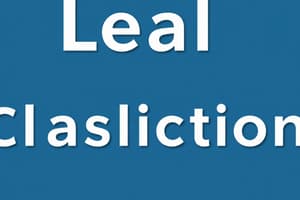Podcast
Questions and Answers
Which element is NOT considered an essential requisite of an obligation?
Which element is NOT considered an essential requisite of an obligation?
- An active subject
- A mutual agreement (correct)
- An object or prestation
- A passive subject
What distinguishes contracts from obligations?
What distinguishes contracts from obligations?
- Obligations arise solely from agreements.
- Contracts are always one-sided.
- Contracts are a source of obligation, while obligations can arise from various sources. (correct)
- Obligations have no legal force.
Which of the following is an example of an obligation arising from law?
Which of the following is an example of an obligation arising from law?
- A lease agreement between a landlord and tenant.
- A unilateral promise to donate.
- A contract of sale for a property.
- The duty of spouses to support each other. (correct)
What is a quasi-contract characterized by?
What is a quasi-contract characterized by?
Which of the following does NOT represent a source of obligations?
Which of the following does NOT represent a source of obligations?
In the context of obligations, which term refers to the power to demand a prestation?
In the context of obligations, which term refers to the power to demand a prestation?
What is the purpose of law as a source of obligation?
What is the purpose of law as a source of obligation?
Which statement best defines the juridical tie in an obligation?
Which statement best defines the juridical tie in an obligation?
What is the term for the delay on the part of the creditor to accept the performance of an obligation?
What is the term for the delay on the part of the creditor to accept the performance of an obligation?
What type of fruit is derived from natural processes without human intervention?
What type of fruit is derived from natural processes without human intervention?
In case of breach of obligation, which remedy allows the creditor to cancel the contract?
In case of breach of obligation, which remedy allows the creditor to cancel the contract?
Which of the following refers to the intentional evasion of fulfilling an obligation?
Which of the following refers to the intentional evasion of fulfilling an obligation?
What type of damages can a creditor recover if the debtor is guilty of negligence?
What type of damages can a creditor recover if the debtor is guilty of negligence?
What does 'Mora solvendi' refer to in terms of obligations?
What does 'Mora solvendi' refer to in terms of obligations?
Which definition best describes negligence in the performance of an obligation?
Which definition best describes negligence in the performance of an obligation?
Which of the following is an obligation of the creditor regarding the fruits and interests from the time the obligation to deliver arises?
Which of the following is an obligation of the creditor regarding the fruits and interests from the time the obligation to deliver arises?
What characterizes a conditional obligation?
What characterizes a conditional obligation?
What distinguishes an act of God from an act of man in the context of force majeure?
What distinguishes an act of God from an act of man in the context of force majeure?
What is an example of a resolutory condition?
What is an example of a resolutory condition?
Which of the following is true about pure obligations?
Which of the following is true about pure obligations?
Which statement correctly defines a fortuitous event in a legal context?
Which statement correctly defines a fortuitous event in a legal context?
What is the primary focus of remedial law?
What is the primary focus of remedial law?
Which of the following statements accurately describes substantive law?
Which of the following statements accurately describes substantive law?
What does the Supreme Court's prerogative to issue procedural rules protect?
What does the Supreme Court's prerogative to issue procedural rules protect?
Which definition accurately describes an obligation in legal terms?
Which definition accurately describes an obligation in legal terms?
What would be considered a characteristic of substantive law?
What would be considered a characteristic of substantive law?
In the context of law, what does the term 'man-made laws' refer to?
In the context of law, what does the term 'man-made laws' refer to?
What distinguishes remedial law from substantive law?
What distinguishes remedial law from substantive law?
Which of the following options best illustrates the concept of 'laws of nature'?
Which of the following options best illustrates the concept of 'laws of nature'?
What type of condition depends solely on the will of one of the contracting parties?
What type of condition depends solely on the will of one of the contracting parties?
What is a primary characteristic of a solidary obligation?
What is a primary characteristic of a solidary obligation?
Which method of extinguishing an obligation involves depositing the object in a competent court?
Which method of extinguishing an obligation involves depositing the object in a competent court?
In terms of obligations, which of the following represents a scenario in which two obligations offset each other?
In terms of obligations, which of the following represents a scenario in which two obligations offset each other?
Which type of obligation allows for one object to be replaced by another?
Which type of obligation allows for one object to be replaced by another?
Flashcards are hidden until you start studying
Study Notes
Overview of Law
- Law can be classified into divine, natural, and man-made.
- Laws of nature are principles governing the universe.
- The hierarchy of laws includes constitutions, statutes, administrative issuances, local ordinances, and jurisprudence.
- Substantive Law defines rights and duties, while Remedial Law prescribes how to enforce or redress violations of those rights.
Obligations
- An obligation is a legal responsibility to give, do, or not do something.
- The four essential elements (APOT) are: the active subject (creditor), the passive subject (debtor), the object (prestation), and the juridical tie (legal basis).
- Sources of obligations are law, contracts, quasi-contracts, delicts, and quasi-delicts.
- Obligations arising from law are imposed by legal provisions, such as the duty of spouses to support each other.
- Obligations from contracts stem from agreements between parties and have the force of law.
- Quasi-contracts are legal relationships arising from unilateral, voluntary acts to prevent unjust enrichment.
- Examples of quasi-contracts include negotiorum gestio (management of another's property without authority) and solutio indebiti (payment made by mistake).
- Accretion refers to the gradual addition of land by natural forces.
- Accessories are things attached to a principal object for ornament or function, such as a key to a car.
Rights of the Creditor
- The creditor has the right to demand performance, recover damages for breach, and receive fruits and interests from the time the obligation becomes due.
- Natural fruits are spontaneous products (grass, trees), industrial fruits are produced through cultivation (vegetables, rice), and civil fruits are derived from legal relationships (rents).
Default or Delay (Mora)
- Mora solvendi is the debtor's delay in performance.
- Mora accipiendi is the creditor's delay in accepting performance.
- Compensatio morae is delay by both parties in reciprocal obligations.
Fraud and Negligence
- Fraud is intentional evasion of fulfilling an obligation.
- Negligence is an omission of the diligence required by the obligation's nature.
- Ordinary diligence in performing obligations is that of a good father.
Remedies for Breach
- The creditor can seek specific performance, rescind the contract, or recover damages (moral, exemplary, nominal, temperate, actual, or liquidated).
Fortuitous Event (Force Majeure)
- Force majeure is a legal excuse for breach except for delivery of generic things.
- Act of God is caused by natural forces, such as a calamity.
- Act of Man is caused by human intervention, including unavoidable accidents without fault or negligence.
Kinds of Obligations
- Pure obligation is not subject to any condition or term.
- Conditional obligation is subject to a future and uncertain event.
- Suspensive condition makes the obligation effective upon the fulfillment of the condition.
- Resolutory condition makes the obligation initially effective but subject to termination upon the event's occurrence.
- Potestative condition depends on the will of one party.
- Casual condition depends on chance or a third person's will.
- Mixed condition combines potestative and casual elements.
- Obligation with a period or term has a specific time for performance.
- Facultative obligation allows the debtor to choose an alternative object for performance.
- Alternative obligation gives the debtor multiple objects to choose from for performance.
- Joint obligation makes each debtor liable only for their proportionate share.
- Solidary obligation makes each debtor liable for the entire obligation.
- Divisible obligation can be divided into separate parts.
- Indivisible obligation cannot be divided into separate parts.
Extinguishment of Obligations
- Payment fulfills the obligation.
- Consignation is depositing the object with a competent court.
- Condonation or remission is the creditor's forgiveness of the debt.
- Confusion occurs when the creditor and debtor become one person.
- Compensation offsets two reciprocal obligations of equal value.
- Novation substitutes or changes the obligation with a new one.
Studying That Suits You
Use AI to generate personalized quizzes and flashcards to suit your learning preferences.




